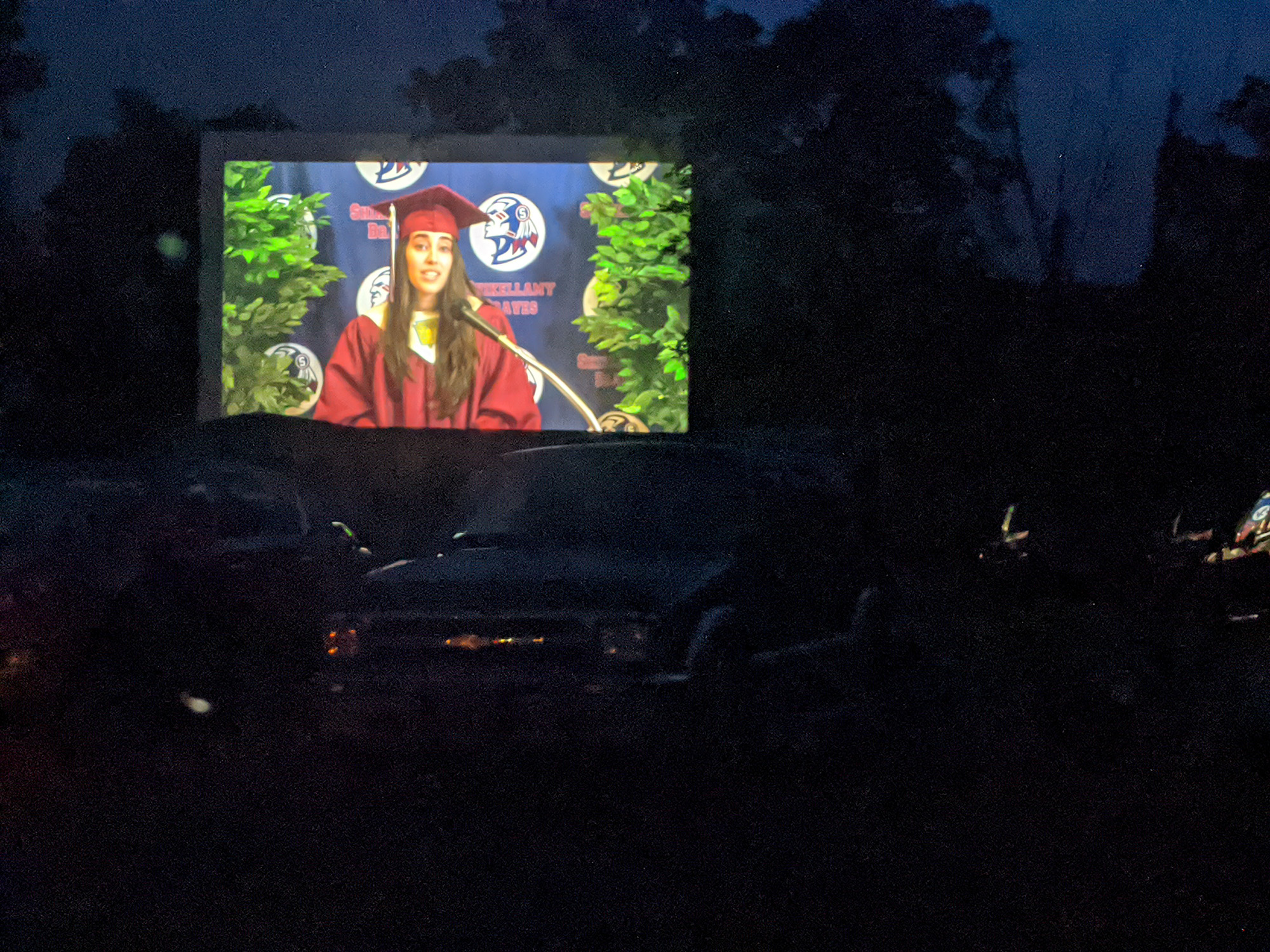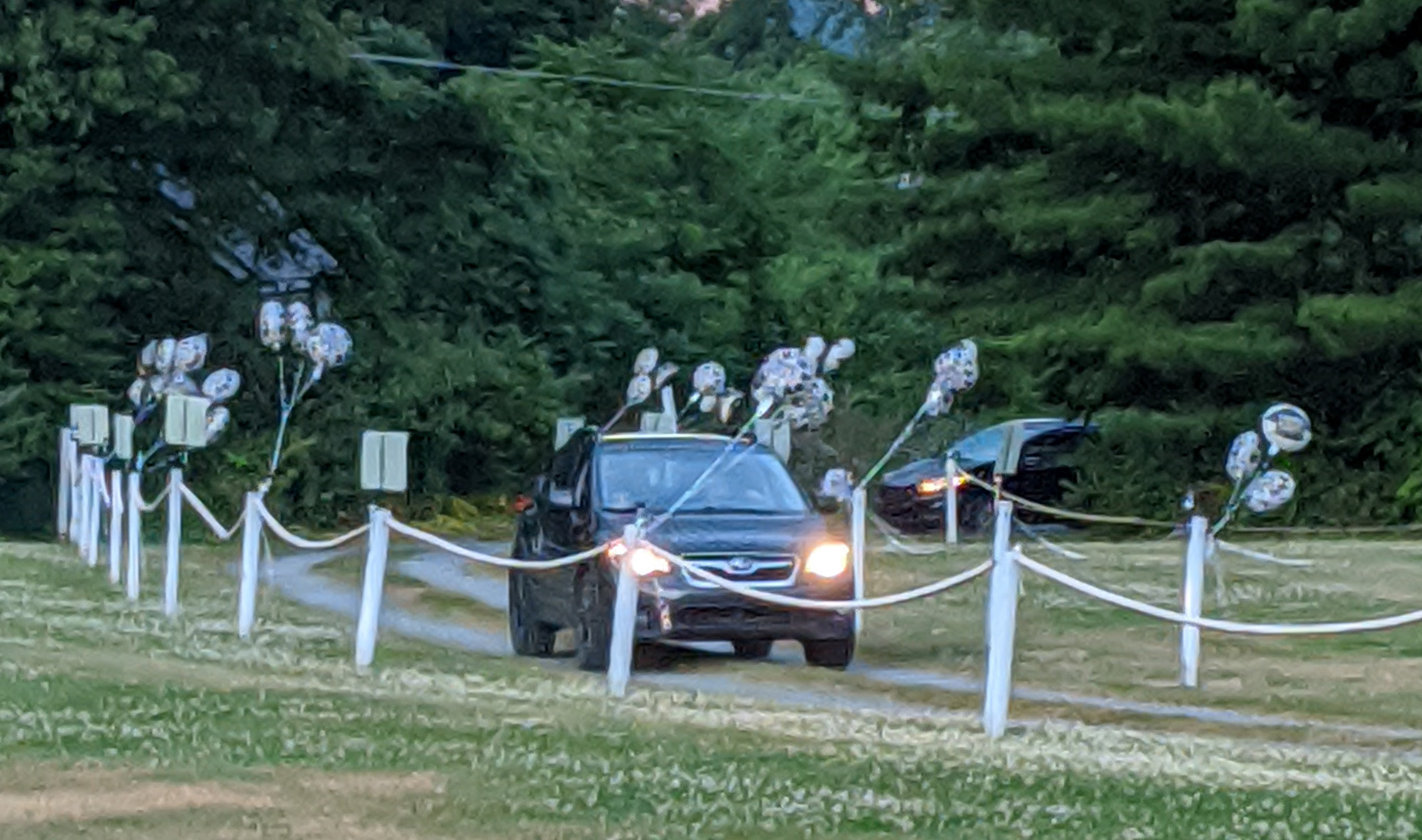Popcorn, chewing gum, and peanuts. Evenings, with your nooi or kêrel in the front seat of the Chevrolet, listening to a crackling outside speaker that looked like a cross between an intercom and a parking meter.
Drive-ins vanished in South Africa, with the rise of the mega-mall. Aside from larney Winelands throwbacks and pandemic-driven, social-distancing popups, the last true South African example closed in February 2014.

Rosella Delgado, one of the two dux students for the Shikellamy Class of 2020, gives her speech. (Photo: Glen Retief)
The US, by contrast, sometimes seems infinitely big, rich, and populous, allowing a thousand subcultures to blossom. Tornado-watching tours and biopunk festivals; Pokemon conventions or craft cider fairs – there’s a niche here for everyone. Then, too, here in the Trump-voting rustbelt, culture itself often seems stuck in a time warp. At the Peters Appliance Store near my house, you can still window- shop for refrigerators, which they’ll happily stow for you on lay-by.
No surprise then that here in Sunbury, Pennsylvania, we have the benefit of a real local drive-in, the Point, one of 330 left in North America. Founded in 1952, it survived a brief closure in the 1950s and an X-rated period in the 1970s. Today, it screens classic reruns, contemporary releases, and family-friendly features.
The mounted speakers have been replaced by an FM radio station. Apart from that, everything about it, from the toll booth entrance to the central cottage housing the concession stand, might have come straight out of, say, Grease, where John Travolta famously gets a car door slammed on his groin after trying to touch Olivia Newton-John’s breasts at the movies.
And now, tonight, a mild Thursday evening in June, my husband and I find ourselves driving up to the Point for – what’s the occasion, exactly? No attendant sits at the ticket booth.
Instead, heart-shaped helium balloons line the driveway: “Hats Off to You”; “Your Future is Here.” A vehicle usher hands us a programme for “Commencement” – graduation – for “Shikellamy High School.”

Vehicles arrive at the Point Drive-In, near Sunbury, Pennsylvania, for the Shikellamy High School graduation. (Photo: Glen Retief)
Perhaps as many as a quarter of a million secondary schools across the globe closed their doors in March 2020. In the northern hemisphere, graduates also lost their traditional rites of passage. No prom kings and queens; no senior picnic or field trip to the grand DC museums.
At the university where I teach, we professors all clapped for graduates during a recorded Zoom meeting; the applause got posted in a special graduation video. High schools gathered on Google Meets, facilitated small family celebrations, or parked hundreds deep at local race tracks.
“We just got lucky,” said Jason Bendle, superintendent of Shikellamy School District, when I asked him what inspired the decision. “How many school districts still have a local drive-in? Plus, after all the disruptions, we wanted to make as much of a special fuss of our seniors as we could.”
The Point has, in fact, been managed for the past 32 years by an alum of Shikellamy High. David Renn is a gregarious, personable man, who chats to me behind the concession stand while he grabs a hamburger and chips.
As we talk, his wife and children stop by. They appear ensconced in the life of the cinema, running errands for the business. I think of the young boy Salvatore in Cinema Paradiso, assisting in the projection room until he fell in love with the movies.
“No regrets,” Renn tells me, when I ask him if he ever wishes he’d gone into a more lucrative, contemporary line of business. He mentions a nephew who made millions in pop-up internet advertising. “But for me, it’s worth it to be such an intimate part of this community.”
That fraternal spirit also motivated him to offer the drive-in as a graduation venue. He has made a point, over his three decades of running the place, of hosting everything from firefighters’ celebrations to nurses’ graduations.
The show begins. My husband and I watch through a rain-splattered windscreen as the principal, the superintendent, the valedictorian and the class president praise the class of 2020 for their creativity and resilience, the good humour with which they fielded quarantine, the way they turned a cancelled flag football match into an impromptu online role-playing tournament.
“Most people forget their high school graduations,” Bendle says, now, in the film. “You guys, on the other hand, will always be the class that graduated in the drive-in.”
Earlier, I’d expressed a similar sentiment to Shai Alvarez, a Shikellamy graduate headed off to study technology.
“But I’ve never had a traditional high school graduation,” Shai replied. “It’s easy to say this is better when you actually have both options!”
The ceremony comes to an end. The last proud graduate walks across the screen and tosses her cap tassel from right to left. The class historian offers a closing, and the band plays an instrumental recession. The closing credits roll, which is, in a way, how movies graduate to the next release from Disney, Warner Bros, or Universal.
An hour after dusk, the world is finally dark. In the Kruger Park or the Kalahari Desert, the sun drops below the horizon, and 15 minutes later you won’t be able to see to tie your shoelaces. Here, in the higher latitudes, the summer twilight lingers.
The cars line up at the exit, their headlights pushing out into the night. Most turn right, back along the Susquehanna River.
The future, indeed, now belongs to these graduates. Beyond commencement ceremonies, how will the pandemic shape their experiences? Workers entering the job market during a recession, let alone a depression, receive smaller salaries over their entire working lives.
As varsity students, will they walk to art movie houses to catch festivals? Or will they stick, for safety’s sake, to Netflix streaming?
How will they navigate the next catastrophe? Climate change; artificial intelligence; water wars?
Will they embrace Microsoft Teams church services, hydrogen cars, and virtual house parties? Or will they return to older pleasures, cooking and baking, hikes in the mountains, and maybe even Saturday evenings at the drive-in, winding down their windows at intermission to listen to the crickets and cicadas? DM
Glen Retief’s The Jack Bank: A Memoir of a South African Childhood, won a Lambda Literary Award. He teaches creative nonfiction at Susquehanna University.



















 Become an Insider
Become an Insider